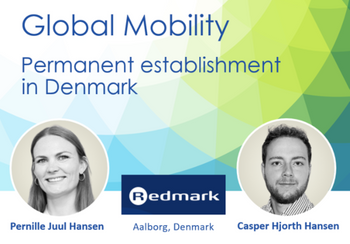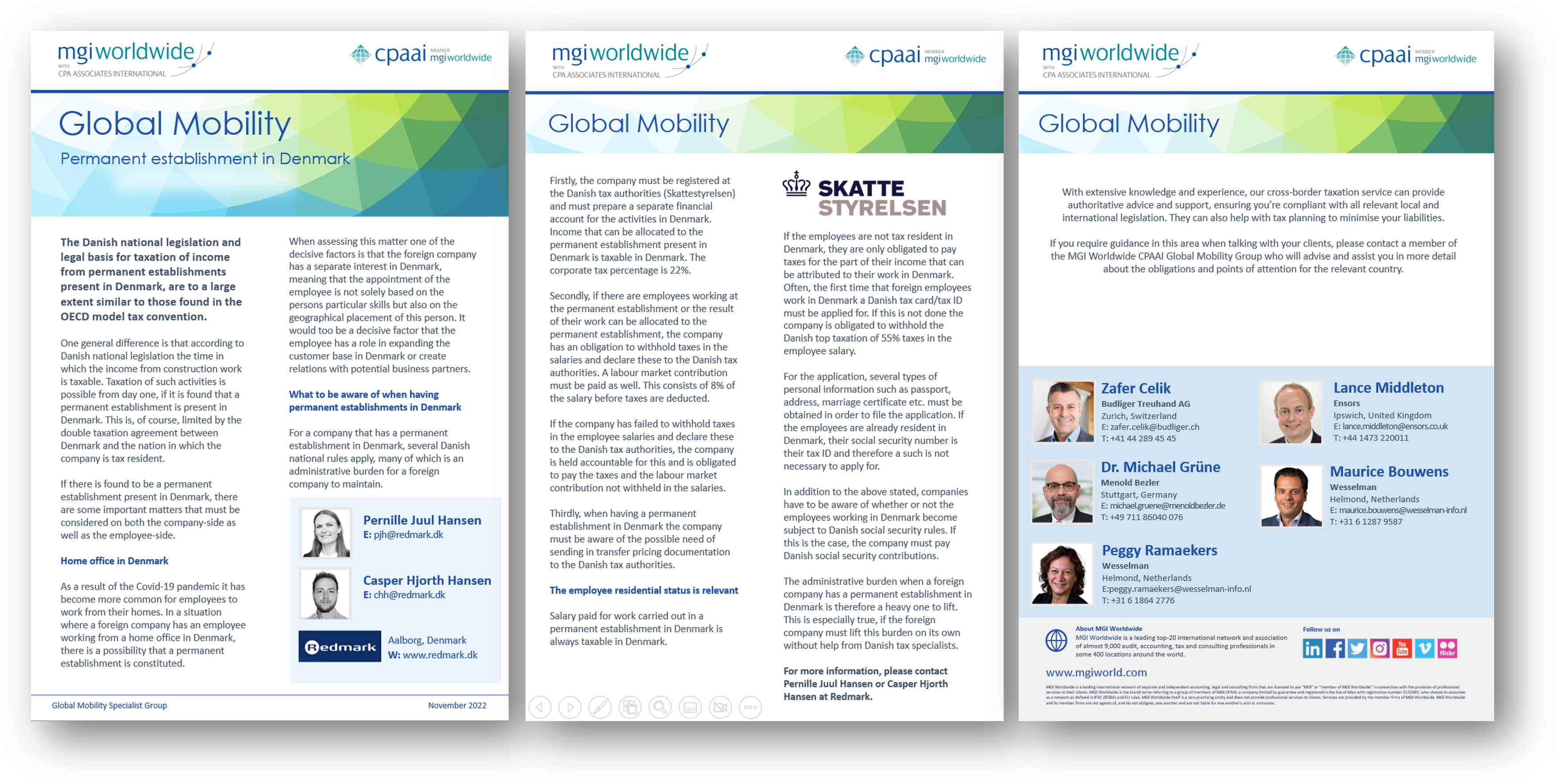MGI Worldwide member Redmark provides report on permanent establishment in Denmark

The Danish national legislation and legal basis for taxation of income from permanent establishments present in Denmark, are to a large extent similar to those found in the OECD model tax convention.
One general difference is that according to Danish national legislation the time in which the income from construction work is taxable. Taxation of such activities is possible from day one, if it is found that a permanent establishment is present in Denmark. This is, of course, limited by the double taxation agreement between Denmark and the nation in which the company is tax resident.
If there is found to be a permanent establishment present in Denmark, there are some important matters that must be considered on both the company-side as well as the employee-side.
Home office in Denmark
As a result of the Covid-19 pandemic it has become more common for employees to work from their homes. In a situation where a foreign company has an employee working from a home office in Denmark, there is a possibility that a permanent establishment is constituted.
When assessing this matter one of the decisive factors is that the foreign company has a separate interest in Denmark, meaning that the appointment of the employee is not solely based on the persons particular skills but also on the geographical placement of this person. It would too be a decisive factor that the employee has a role in expanding the customer base in Denmark or create relations with potential business partners.
What to be aware of when having permanent establishments in Denmark

For a company that has a permanent establishment in Denmark, several Danish national rules apply, many of which is an administrative burden for a foreign company to maintain.
Firstly, the company must be registered at the Danish tax authorities (Skattestyrelsen) and must prepare a separate financial account for the activities in Denmark. Income that can be allocated to the permanent establishment present in Denmark is taxable in Denmark. The corporate tax percentage is 22%.
Secondly, if there are employees working at the permanent establishment or the result of their work can be allocated to the permanent establishment, the company has an obligation to withhold taxes in the salaries and declare these to the Danish tax authorities. A labour market contribution must be paid as well. This consists of 8% of the salary before taxes are deducted.
If the company has failed to withhold taxes in the employee salaries and declare these to the Danish tax authorities, the company is held accountable for this and is obligated to pay the taxes and the labour market contribution not withheld in the salaries.
Thirdly, when having a permanent establishment in Denmark the company must be aware of the possible need of sending in transfer pricing documentation to the Danish tax authorities.
The employee residential status is relevant
Salary paid for work carried out in a permanent establishment in Denmark is always taxable in Denmark.
If the employees are not tax resident in Denmark, they are only obligated to pay taxes for the part of their income that can be attributed to their work in Denmark. Often, the first time that foreign employees work in Denmark a Danish tax card/tax ID must be applied for. If this is not done the company is obligated to withhold the Danish top taxation of 55% taxes in the employee salary.
For the application, several types of personal information such as passport, address, marriage certificate etc. must be obtained in order to file the application. If the employees are already resident in Denmark, their social security number is their tax ID and therefore a such is not necessary to apply for.
In addition to the above stated, companies have to be aware of whether or not the employees working in Denmark become subject to Danish social security rules. If this is the case, the company must pay Danish social security contributions.
The administrative burden when a foreign company has a permanent establishment in Denmark is therefore a heavy one to lift. This is especially true, if the foreign company must lift this burden on its own without help from Danish tax specialists.
With extensive knowledge and experience, our cross-border taxation service can provide authoritative advice and support, ensuring you’re compliant with all relevant local and international legislation. They can also help with tax planning to minimise your liabilities.
If you require guidance in this area when talking with your clients, please contact a member of the MGI Worldwide CPAAI Global Mobility Group who will advise and assist you in more detail about the obligations and points of attention for the relevant country.
Download the full article HERE.
For more information about the permanent establishment in Denmark, please contact Pernille Juul Hansen ([email protected]) or Casper Hjorth Hansen ([email protected]) at Redmark.
If you require guidance in this area when talking with your clients, please contact a member of the MGI Worldwide CPAAI Global Mobility Group who will advise and assist you in more detail about the obligations and points of attention for the relevant country.
MGI Worldwide with CPAAI, is a top 20 ranked global accounting network and association with almost 9,000 professionals, accountants and tax experts in some 400 locations in over 100 countries around the world.
